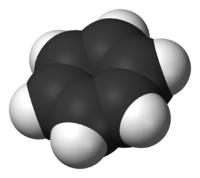
Photo from wikipedia
Abstract The electrochemical reduction of liquid toluene to methylcyclohexane (MCH) was investigated using a membrane electrode assembly (MEA) and high active-area catalysts commonly used in proton exchange membrane fuel cells… Click to show full abstract
Abstract The electrochemical reduction of liquid toluene to methylcyclohexane (MCH) was investigated using a membrane electrode assembly (MEA) and high active-area catalysts commonly used in proton exchange membrane fuel cells (PEMFC). The current density on Pt/C was higher than on PtRu/C, which was comparable to that of alkaline water electrolysis. The potential of hydrogen evolution was shifted negatively by the presence of toluene and MCH. Therefore, the toluene reduction reaction was almost perfectly separated from the hydrogen evolution reaction. Toluene was perfectly reduced to MCH at around 0 V vs. RHE on PtRu/C and no by-products were detected in the solutions after electrolysis. MCH was produced at a Faradaic efficiency of more than 96% by carefully keeping the potential above −30 mV vs. RHE. Through this electrolytic process, we were able to reduce the concentration of toluene from 100% to 7.6%.
Journal Title: Journal of Power Sources
Year Published: 2017
Link to full text (if available)
Share on Social Media: Sign Up to like & get
recommendations!